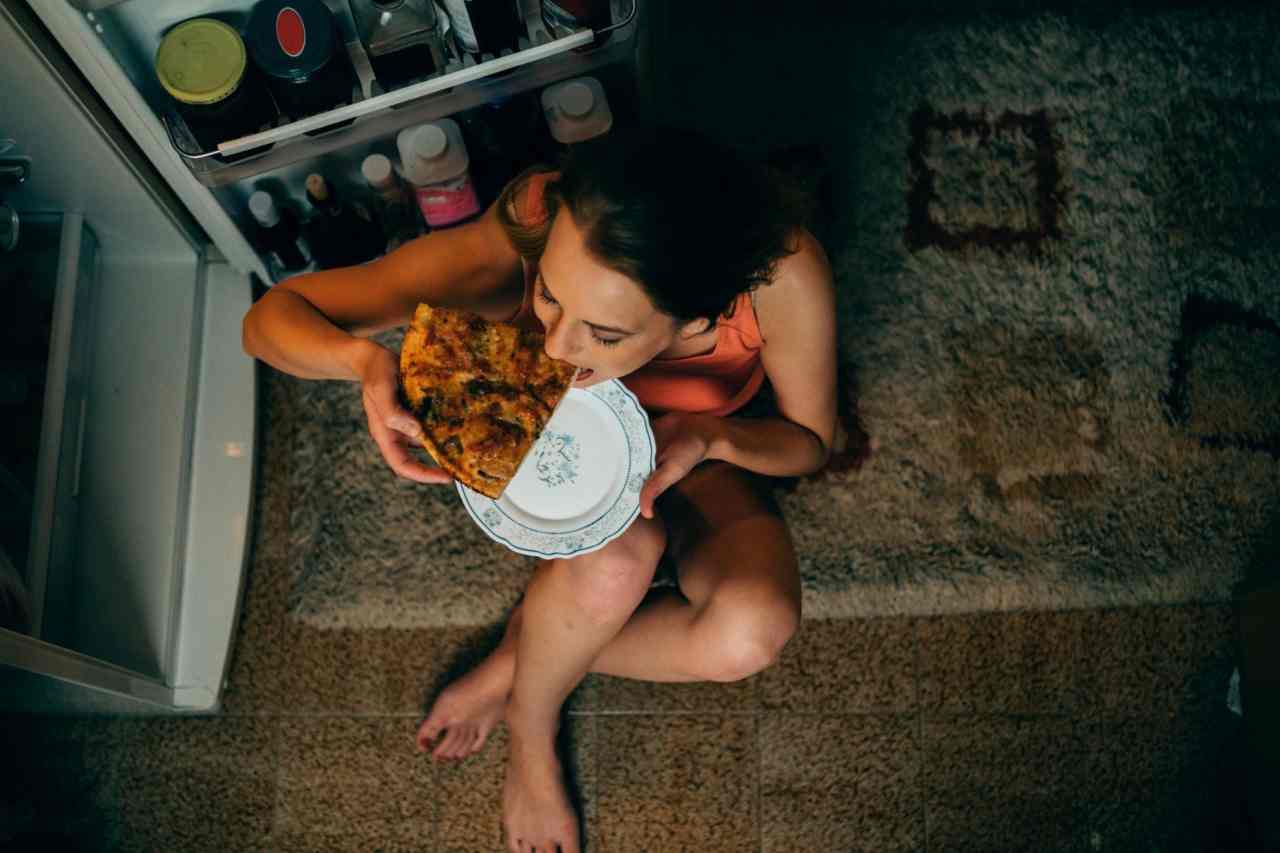Even when you’ve eaten your three meals a day and some snacks in between, you may discover that you simply’re nonetheless a bit hungry towards the top of the night time — simply round once you’re heading off to mattress. It’s fairly widespread, and never at all times a foul factor, to really feel your abdomen rumbling so late at night time.
One of many largest culprits for late-night starvation is because of being in a calorie deficit — i.e., burning extra energy that day than you consumed — which can be the results of being lively. When this occurs, ignoring your physique’s cues to have a small snack and going to mattress famished can really backfire, warns Suzanne Dixon, RD, an epidemiologist with Cambia Well being Options in Portland, Oregon. “Starvation can disrupt sleep, and lack of sleep can enhance manufacturing of stress hormones corresponding to cortisol which will result in overeating the subsequent day,” she explains.
There are a couple of vital components to contemplate, nonetheless, when chomping down within the night. In actual fact, when you’re not choosing the proper meals and the correct quantities, in addition to factoring in what you’ve already consumed through the day, you may end up feeling notably energy-deprived the next morning.
Right here, vitamin execs clarify among the ways in which your seemingly innocent bedtime snack might be leaving you sluggish the subsequent day.
1. It’s too caloric.
Having a big snack — greater than 200 to 300 energy max — can disrupt sleep and contribute to heartburn. (Mendacity down after a giant snack is a standard perpetrator for reflux.) “Nothing will make you sluggish the subsequent day like being up and down with digestive discomfort,” Dixon warns.
She recommends preserving your snacks mild and balanced. “Strive half a protein shake, corresponding to ½ scoop of protein powder, ½ banana and 1 tablespoon of nut butter,” she says. “Even reheating a small portion of no matter you had for dinner can work nicely.”
2. It’s stuffed with sugar.
It’s widespread to crave one thing candy, particularly after dinner, however it’s possible you’ll wish to suppose twice earlier than serving your self a couple of scoops of ice cream earlier than mattress. “The excessive ranges of sugar in ice cream could cause a nice spike in your blood sugar adopted by a dip that’s usually decrease than your baseline,” warns Tansy Rodgers, FNTP, purposeful dietary remedy practitioner. “It’s possible you’ll wake within the morning sleepy as a result of your blood sugar has tanked all through the night time.”
Another excuse to go on the ice cream is as a result of an estimated 36 p.c of People are lactose illiberal, per the Nationwide Institute of Diabetes and Digestive and Kidney Illnesses, which suggests they expertise a slew of disagreeable signs after consuming dairy, together with bloating, gasoline, diarrhea and nausea. In brief, you received’t be getting a lot shut-eye once you really feel sick from the ice cream you consumed proper earlier than mattress.
3. It’s full of straightforward carbohydrates.
In case your nighttime cravings are usually extra savory than candy, you may suppose to achieve for crackers or a bag of chips. This isn’t the perfect thought, in accordance with Rodgers. “Most typical chips are made with industrial seed oils (i.e., vegetable oils, canola oil, safflower oil, and many others.), salt and preservatives, which may all trigger intestine irritation and physique swelling, and are arduous to digest,” she says. “In case your physique is attempting to course of all this late at night time and coping with any detrimental uncomfortable side effects, it’s possible you’ll end up having a stressed night time.”
What’s extra: Chips are arduous to restrict by way of the quantity, so what might need began as a well-intended handful can rapidly escalate to you consuming half the bag. “Not solely is that this a considerable amount of carbohydrates to ingest at night time, together with elements which are arduous to digest, however this straight impacts your blood sugar and may depart you waking fairly sleepy,” Rodgers says.
As a substitute, she suggests choosing chips that use sea salt (i.e., Celtic or Himalayan sea salt) and wholesome oils (i.e., avocado or coconut) and that don’t include preservatives. Additionally, hold your serving to a handful at most, she says.
4. Your “snack” is alcoholic.
Should you’re hoping to quench your starvation with a bit liquid braveness, whether or not that’s a glass of wine or a shot of liquor, you might need a neater time falling asleep initially however are more likely to get up within the early-morning hours due to elevated cortisol, Rodgers warns. What’s extra: Alcohol is a diuretic, which suggests it really depletes your physique of water, leaving you in a state of dehydration. Being dehydrated not solely will make you are feeling sluggish the subsequent day but in addition will depart you with a headache.
As a substitute of an alcoholic-based beverage, Rodgers suggests sipping on some caffeine-free tea or perhaps a heat glass of coconut milk with cinnamon, nutmeg and cardamom. “Should you actually wish to have your glass of wine, keep on with one small glass and attempt to have it barely earlier within the night, leaving about three hours or so earlier than bedtime.”
5. It’s too excessive in protein.
Protein is a vital macronutrient that helps your physique construct and retain muscle, so it’d make sense to go for a snack that accommodates a wholesome portion of protein. Nevertheless, Rodgers warns {that a} high-protein snack may depart you feeling sluggish the subsequent day. The primary purpose for it’s because protein is tough for the physique to digest, which may interrupt your sleep.
She additionally factors out that in case your protein of selection occurs to be processed meat, they are often power sabotaging for an additional purpose. “Some processed meats, corresponding to pepperoni and salami, really stimulate the mind as a result of they include tyramine, an amino acid that triggers the discharge of norepinephrine, a mind stimulant.
As a substitute, she recommends snacking on advanced carbs which have a bit little bit of protein, like bananas and mangoes. “This manner, you get the serotonin-boosting carbs but in addition the protein to decelerate the impression that the carbs could have in your blood sugar ranges, leaving you extra satiated and extra balanced power within the morning.”
6. It’s too spicy or acidic.
As tasty as they is likely to be, spicy or acidic meals could cause heartburn, particularly for somebody who’s already susceptible to gastroesophageal reflux illness, Rodgers warns. “At night time, when it’s time to lie down, that positioning really makes heartburn worse,” she says. “So if you’re having a heartburn assault after which try to lie able that makes the burning worse, it’s going to most definitely disrupt your sleep and trigger you to be extra stressed.”
Stressed sleep and even struggling to go to sleep means you aren’t getting your relaxation, due to this fact not permitting your physique to recoup in methods wanted to really feel energetic within the morning.
Whereas it’s most optimum to keep away from some of these meals altogether through the nighttime hours, when you do end up struggling the implications, Rodgers recommends taking a pure complement periodically to calm the burn.
7. It accommodates an excessive amount of fats.
Fats is one other vital macronutrient, however it sadly can decelerate digestion. Because of this it takes longer to your physique to digest meals with high-fat content material, leaving it sitting in your abdomen all through the night time. “Fats is nice for smoothing out how power will get out of your digestive tract into your bloodstream and your physique’s cells and retains you full longer, however it could sit in your digestive tract like a lump and disrupt sleep when you eat an excessive amount of,” Dixon says. She recommends preserving fats to not more than 10 grams to your bedtime snack.
8. You’re consuming it too near bedtime.
Whereas snacking a bit earlier than you fall asleep is often OK, Dixon recommends spacing it out not less than an hour from once you really nod off to sleep to keep away from digestive upset and attainable reflux points. “Set an alarm to remind you of your ‘no-eating-after’ time,” she says. “Should you usually go to mattress at 10 p.m., for instance, set your alarm for 8:45 p.m. so that you get a 15-minute warning and time to squeeze in a fast snack pre-bedtime, when you want it.”







